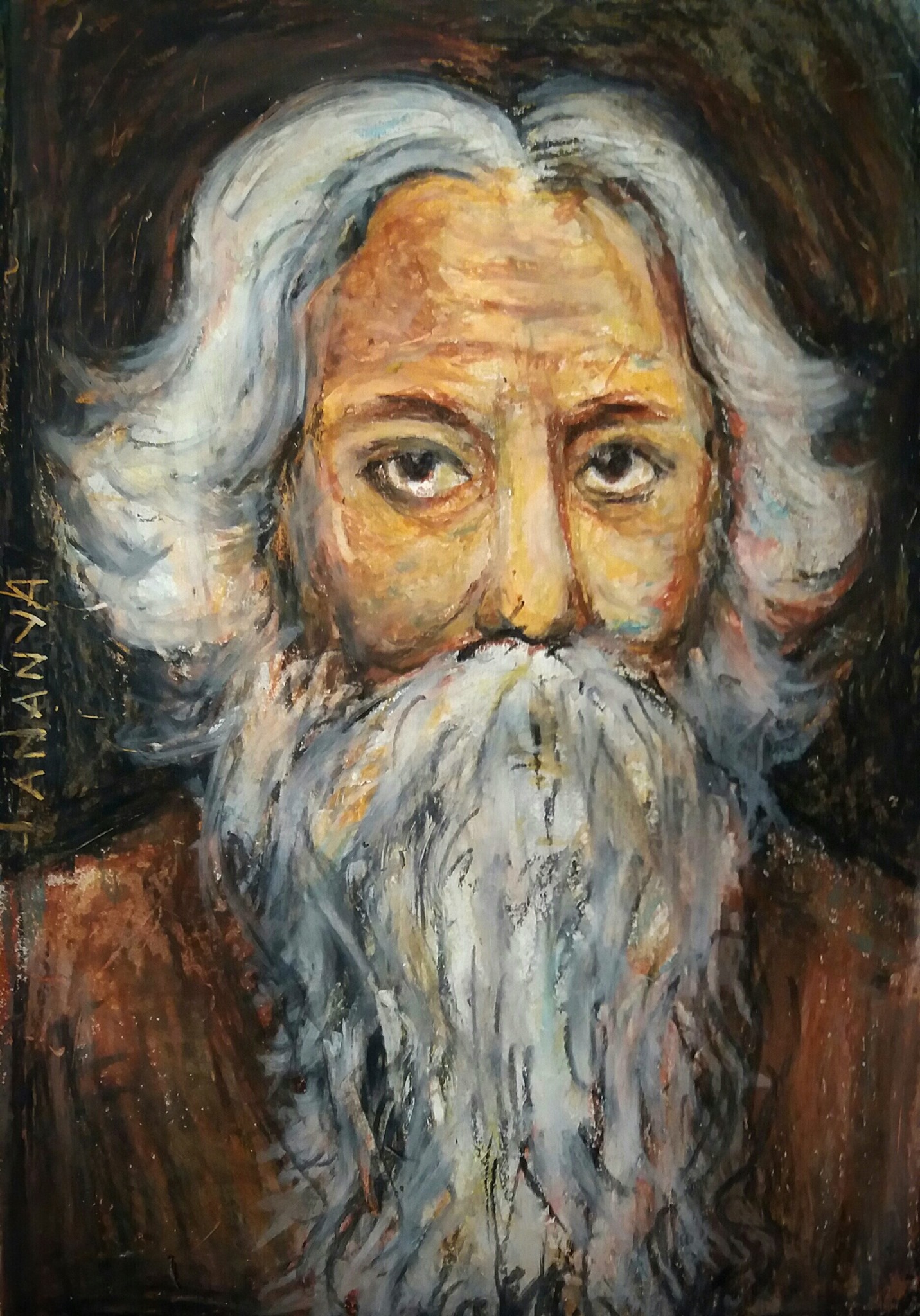
Drawing : Ananya Aloke
History in its folds saves some treasured people who shine so bright in their time that their visions and examples serve as light beacons for the future generations to come. One such renowned and an amiable person whose name is written in golden letters in the history of our country is Rabindranath Tagore. The world waits for ages to find a man of such caliber. He was not only one of the most celebrated poets in the 19th – 20th century but also was a musician, polymath, artist, and Ayurveda-researcher. For the introduction of the English translated ‘Gitanjali’, the Irish poet W. B. Yeats wrote-
“We write long books where no page perhaps has any quality to make writing a pleasure, being confident in some general design, just as we fight and make money and fill our heads with politics—all dull things in the doing—while Mr. Tagore, like the Indian civilization itself, has been content to discover the soul and surrender himself to its spontaneity.”
Not only the Bengali literature and music, but he also reshaped the horizon for Indian art and Contextual Modernism of his era. The name Rabindranath Tagore is not unfamiliar to people around the world, his name is especially revered in Bengali households. Whenever the name Tagore comes up, the fact that he was the first non-European to win the Nobel Prize in Literature also finds its way to the brains but apart from all the glories and accolades he garnered, people really appreciated him for his vision.
A wise man seldom speaks above the din but lets his actions do the talking. Tagore had very clear views related to India’s freedom struggle, the country’s economy and in all of the visions, the one that was perhaps the most important was his vision regarding education. For a man born in the 19th century, the vision Tagore had, related to education was quite modern, to say the least. Since early childhood, Tagore, if given the option, would prefer to roam about, surrounded by nature than to be cooped up inside a classroom. Tagore loathed formal education with all his heart —his scholarly travails at the local Presidency College spanned the duration of a single day. Years later he shared his views about teaching by saying that proper teaching does not explain things; proper teaching stokes curiosity, the fuel that is needed to find answers.
Tagore believed that the education that we impart to students now, makes them accept the world the way it is. If this process is kept up then the spark of curiosity would no longer fire the students and education would become a cruel necessity. Tagore thought about the positive aspects of globalization in the field of education when the term ‘globalization’ wasn’t even coined. He envisioned a form of education that was firmly rooted in one’s immediate surroundings but would be connected to the cultures of the wider world. Education, for Tagore, was not only about collecting information but about making our lives in harmony with everything that surrounds us.
Tagore always had a distaste for the modern form of mechanical learning that focuses merely on the promotion of the individual’s mind, what he always favored was the form of learning that encourages the creativity, imagination, and moral consciousness of students. He believed that education should be not for mere achievements or accolades but for the enlightenment of heart and the inculcation of a spirit of compassion, service, and altruism in the individual so that the people can rise above egocentrism to a state of global perception.
Do you know what’s the subtle difference between a thought and an idea?
Thoughts are a form of mental process that keeps on going in the mind unchecked but ideas refer to a plan or a method that occurs in the mind concerning the achievement of a work or duty. Every human being thinks; it’s human nature, but very few people polish those thoughts into ideas and execute them so that their thoughts see the light of the sun. Tagore was one of the highly skilled people to shape his vision about education into reality when he established an experimental school at Shantiniketan on December 22, 1901, which later grew into the Vishva Bharti University in 1921. It embodied the vision of Tagore of a place of education that would be unfettered by regional and religious barriers.
Located in the laps of nature, the school intended to combine education with a sense of commitment towards the larger civic community. Amalgamating the best of western and the traditional eastern systems of education, the curriculum circled around nature with classes being held in the open air like the gurukul system prevalent in our Vedic times.
Experience promotes future action. What Tagore envisioned for his students was to make them feel free despite being in the formal learning environment of a school, since he himself had dropped out of school when he felt claustrophobic within the four walls of a classroom and found his thought process being restricted by the dreary books.
Tagore himself developed the curriculum that was a unique union of art, human values, and cultural intermingling. Nature walks were an important part of the curriculum and special attention was paid to natural phenomena where students were encouraged to follow nature’s cycle for insects, birds, and plants. Special emphasis was also laid on vocational education and flexible class schedules were followed to accommodate the shift in weather and festivals for children that originated out of Tagore’s mind.
In one of his letters to Mahatma Gandhi, Rabindranath Tagore compared his educational experiment at Santiniketan to a ferry carrying the shipment of his ‘life’s finest treasure’. He dedicated more than forty years of his life in establishing and nurturing Visva-Bharati, which had an extensive influence in Europe, Japan, and the United States. It was a unique instructive institution, which laid stress on the education of the whole person, not only the intellectual self but the moral and social aspect of the individual as well.
When you plan something in your head, it’s very difficult to predict its success in reality but Rabindranath Tagore had a plan laid in his mind about how education should be imparted to the students and he showed the world what a beautiful learning environment can be created where education is just not a necessity, where knowledge is a thirst and where students aren’t spoon-fed but allowed to observe and ask questions. When a person’s interest is piqued, the journey doesn’t become a burden but a path of adventure. Tagore wanted an education system that could ignite in the students the thirst for knowledge while fostering the humane and moral values in a person.
In the era of profit-making, where the field of education is turning into a lucrative money-making business, people aim to get educated for better opportunities in life. When being a better human takes a back seat, to garnering better job opportunities, we somewhere deep in our hearts know that we need another Tagore to explain to us his vision for education and to take us down the lane where formal education doesn’t just mean rote learning but a place where development of variety is provided without loosening the hold on the integral or spiritual unity.
Author Bio: Mobani Biswas is a young poetess who believes in penning verses out of unexpressed emotions. After completing her Masters in English Literature from the University of Allahabad, she is currently pursuing B.Ed with the aim to teach and share her knowledge with the children who are the future of our country.


